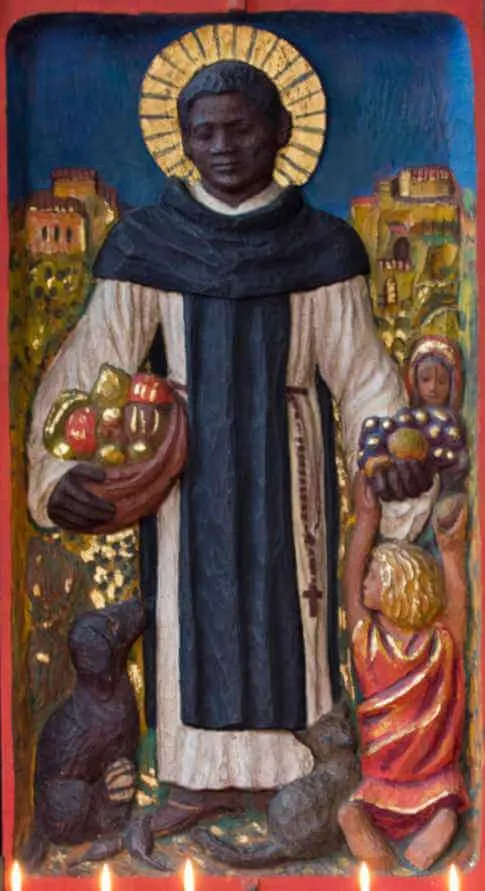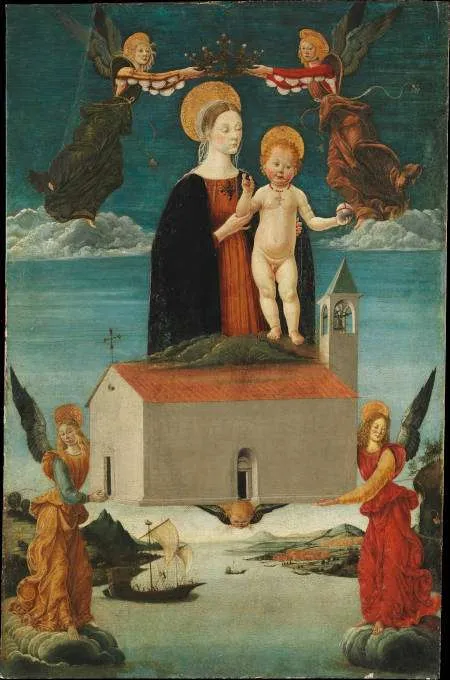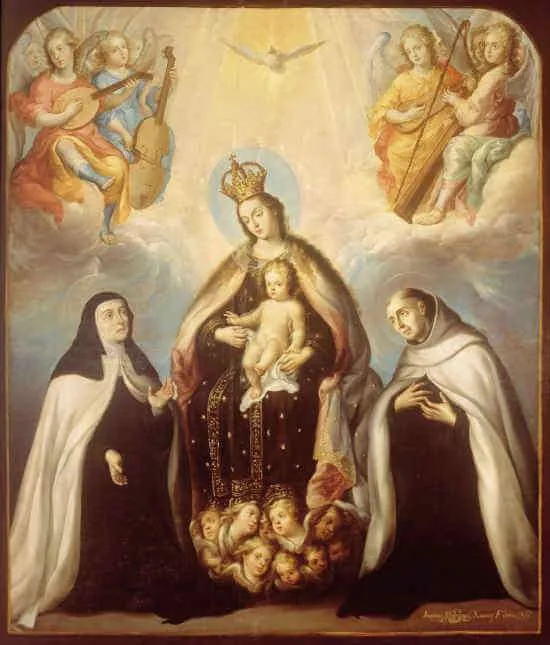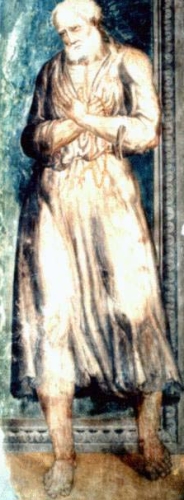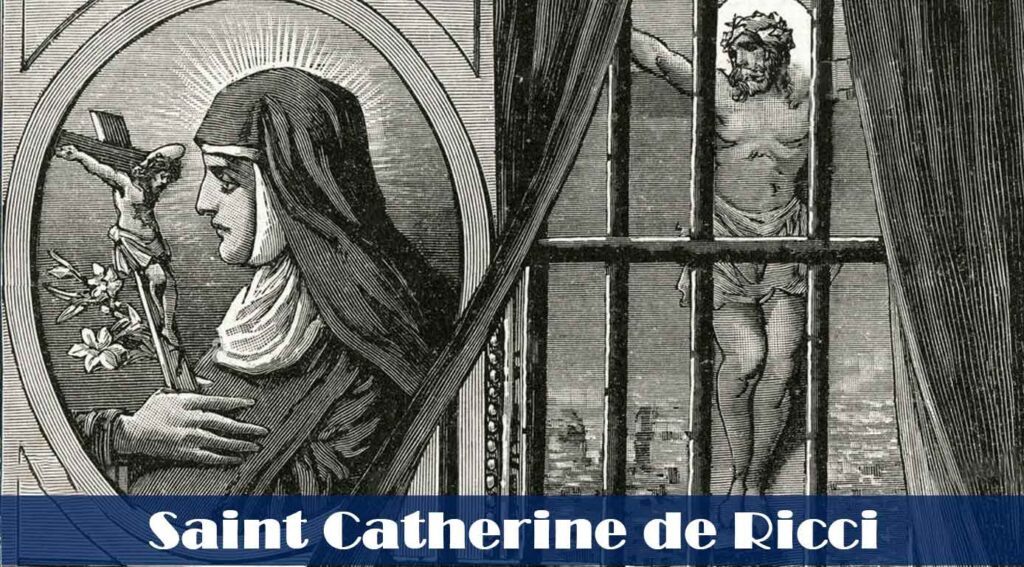1579–1639; Patron Saint of African-Americans, biracial people, barbers, innkeepers, the poor, Peru, public health workers, public schools, television, and interracial and social justice; Canonized by Pope John XXIII on May 6, 1962
In 1532, Spanish explorers arrived in modern-day Peru and captured the Incan Emperor, Atahualpa, marking the beginning of Spanish control in the region. Just five years later, Pope Paul III issued a papal bull lamenting the reports that many Spanish generals were acting as tyrants and plunderers, cruelly oppressing the indigenous peoples. They were stealing their silver and gold, taking their lands, forcing them into slave labor, and treating them as subhuman. In 1542, Spain established the Viceroyalty of Peru, formalizing political control over the region. Though some arriving missionaries defended the rights of the natives, much of the cruelty continued. King Philip II of Spain was also aware of the chaos and tried to intervene but had little success. In 1581, King Philip decided to send his best bishop to Peru. He chose the future Saint Turibius of Mogrovejo, who would help transform the new nation over the next twenty-five years. Saint Turibius was one of five saints who emerged from Peru in the late sixteenth to early seventeenth centuries. The others were Saints Rose of Lima, Juan Macías, Francis Solano, and the saint we honor today, Martin de Porres.
Martín de Porres y Velázquez was born in Lima, Viceroyalty of Peru, just two years before Saint Turibius of Mogrovejo arrived as the new archbishop and thirty-seven years after the Spanish-controlled Viceroyalty of Peru was established. Martin’s father was a Spaniard, and his mother was a freed slave of either African or native descent. According to the custom of the time, this made Martin an illegitimate child of mixed race, earning him the demeaning label of “mulatto.” He had one sister two years younger.
After Martin’s sister was born, their father, ashamed of his dark-skinned children, abandoned the family, leaving their mother, Ana, to raise the children on her own. Ana earned a meager living washing clothes, so the family was quite poor. Because the Spanish settlers brought with them missionaries, there had been a concerted effort over the previous decades to catechize and baptize both the natives and the African slaves. Though there is little documentation about Martin and his sister’s early faith formation, it is clear that Martin developed a profound love of God from an early age and a love for the poor and suffering. One story relates that when Ana sent Martin to the market to purchase food for the family, he often gave the food away to the poor on the way home. By the time Martin was twelve years old, his mother could no longer afford to feed him, so she sent him to a school where he was able to live and study for a couple of years. Afterwards, a barber-surgeon took him in and taught him his trade. Though “barbers” and “surgeons” might not seem to be of the same trade, these were among the most common medical practitioners at the time. Because barbers became skilled with blades for haircutting, they were also called upon for surgeries and learned other basic medical techniques. Martin soon fell in love with this trade, because it gave him an opportunity to not only support himself but also to be of service to others.
During his internship as a barber-surgeon, Martin’s prayer life deepened. He often spent hours every night in prayer, entering deeper and deeper into divine union. He always had an admiration for the Dominican friars in Lima, but it was against Spanish law for those of mixed race to become a professed religious. Since he had a deep desire to share in the Dominican life, he went to the Holy Rosary friary in Lima and petitioned the superior to admit him as a non-professed lay brother. Permission was granted.
For the next eight years, Martin lived and dressed as a Dominican but worked as a servant of the community. He cut the friars’ hair, cooked, cleaned, did laundry, and used his medical knowledge to care for the sick. Eventually, he did his duties so well that he was put in charge of the alms that the community distributed to the poor. Those eight years were a time of profound humility. Martin never complained but eagerly served the friars and local community in the most menial ways, with the most tender compassion and concern. Though some still looked down on him as “mixed-breed” and as an “illegitimate child,” those with a Christian soul couldn’t help but notice the extraordinary virtue Martin manifested. As a result, after eight years of humble service, the superior of the community of 300 friars decided to ignore the Spanish law and asked Martin to take formal vows as a Dominican at the age of twenty-four, which he did out of obedience. Over the next ten years, Brother Martin continued his humble service and grew deeper in prayer every year, spending countless hours before the Blessed Sacrament and developing a deep devotion to our Blessed Mother. He also submitted himself to severe penances, and his humility exponentially increased. One day, when the friary was struggling with finances and the superior was looking for things he could sell to raise money, Brother Martin exclaimed with sincerity, “I am only a poor mulatto, sell me!”
At the age of thirty-four, Brother Martin was placed in charge of the infirmary, a duty he would fulfill for the next twenty-five years until his death. As the infirmarian, Brother Martin used the skills he had learned as a barber-surgeon to help heal many people. People started to notice, however, that his medical remedies appeared to be backed by supernatural power. Miracles began to be reported. Though this was impressive to many, Brother Martin’s profound humility, compassion, and spiritual wisdom made an even greater impact. He cared not only for the Dominicans, but regularly sought out the poor and sick within the community, sometimes bringing the most diseased and emaciated into the friary and even providing his own bed. Though some brothers complained, Brother Martin’s depth of love was so convincing that the complaints quickly vanished.
Little by little, Brother Martin began to have a profound effect upon not only the friars but on all of Lima. His miracles increased. Sometimes he miraculously appeared in the room of a sick friar to care for him without even opening the door. Bi-locations were reported, and those arriving from Europe and Africa even claimed that he had appeared to them there, before they arrived in Peru. He founded a home for orphans. He continuously begged for alms throughout the city, distributing all he received to the other friars and the poor of the city. While in prayer, some saw him enveloped in light or levitating. He could read souls and was given miraculous wisdom and knowledge that led the most learned of men to seek his counsel. Miraculous cures were abundant, and his charity never ceased. He was even loving to stray animals, treating them with dignity as God’s creatures, some claiming he was even able to miraculously communicate with them. After his death, the miracles increased as people sought his intercession. Twenty-five years after his death, Martin’s body was exhumed and found to be incorrupt.
Saint Martin de Porres began his life in poverty and rejection. These sufferings, however, did not negatively affect his soul but only led to the increase of his virtue. His soul was so deeply united to God that God worked miracles through him. As we honor this saintly humble Dominican brother, ponder anything in your life that leaves you angry and discouraged. Saint Martin had many such temptations, but he turned them all into opportunities of grace. Allow Saint Martin to inspire you to do the same, so that God can use every cross in your life to bring forth an abundance of His love.
Source: https://mycatholic.life/saints/saints-of-the-liturgical-year/november-3—st-martin-de-porres-religious/

